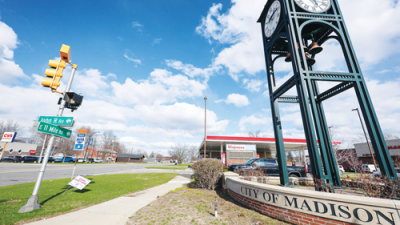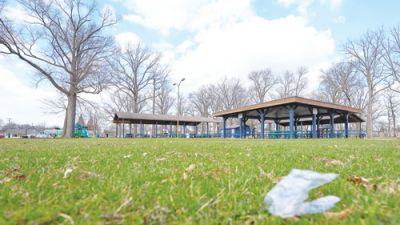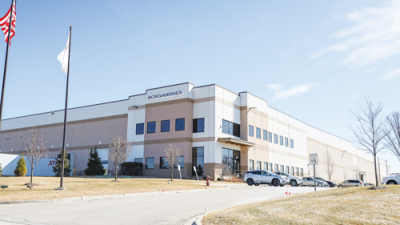
Arctic Fox plans to operate JARS Cannabis at the site of the former Mac’s Party Store at 1035 12 Mile Road, demoing the former J&H Hydraulic as part of the build, while 305 N Euclid will operate Dispo Cannabis at 32371 Dequindre Road.
Photos by Patricia O’Blenes
MADISON HEIGHTS — Faced with the prospect of costly litigation, a divided Madison Heights City Council has approved additional cannabis licenses for two companies that were previously denied.
City Councilman David Soltis was the deciding vote at the meeting Jan. 22, changing his vote from “no” to “yes,” shifting the 4-3 majority in favor of settling the lawsuits advanced by Arctic Fox LLC and 305 N Euclid LLC, allowing both into the community.
The council also amended the city ordinance to increase the number of licenses for marijuana establishments from three to five, since the first three licenses were already taken. But this was done with a caveat: If any of the current marijuana establishments cease operations in the city, the city is not obligated to make their licenses available again.
The other votes matched the last time council examined the issue, which was Nov. 16, 2023. Mayor Roslyn Grafstein, Mayor Pro Tem Mark Bliss and City Councilman Sean Fleming once again voted “yes,” while Councilwoman Emily Rohrbach, Councilman Quinn Wright and Councilman Bill Mier voted “no.”
Arctic Fox and 305 N Euclid had previously been runners-up in the approval process. They had alleged that the city’s process wasn’t fair. Frank DeLuca and Reese Serra — representing Arctic Fox and 305 N Euclid, respectively — did not return requests for comment by press time.
Soltis said it was not an easy decision to change his vote. Historically, he has opposed every cannabis company that has come before council. But he said that he decided to make an exception after carefully considering the costs of a protracted legal battle.
“It’d be easy to play politics and oppose it without caring about the astronomical lawyer fees. It’s much harder to oppose this in principle but also cast the tough vote after reviewing the costs,” Soltis said. “The city, and ultimately the residents, were going to bear the brunt (of ongoing litigation).”
What’s coming
At press time, Melissa Marsh, the city manager of Madison Heights, said she does not know when the two establishments were expected to open.
According to their proposals, 305 N Euclid will operate Dispo Cannabis, renovating a site located at 32371 Dequindre Road. Arctic Fox will operate JARS Cannabis, leasing the site of the former Mac’s Party Store at 1035 12 Mile Road, and also demoing the blue building at 1031 12 Mile, formerly J&H Hydraulic Co. The blue building there will be converted into a parking lot, and Arctic Fox will renovate the plaza and clean up the corner, constructing a new building at the back of the property where the processing and grow operation will be located.
305 N Euclid filed its lawsuit in July 2023, roughly a year after applying for its license. Arctic Fox first applied for its license in August 2022, and filed suit in November 2022.
Settlement terms
As part of the deal, Arctic Fox and 305 N Euclid will each make one-time payments of $175,000 to the city — more than the $150,000 originally discussed — plus recurring annual payments of $25,000 to a community fund, and an annual donation of 1% of the preceding year’s net profits. A rep from each company will serve on the committee overseeing the community fund. Each company will also pay for their license and inspection fees, and honor other stipulations such as the installation of camera systems to monitor each property, with the Madison Heights Police allowed unfettered access to the footage.
Bliss said the increased payout will help the city recoup the cost of litigation thus far. He also noted that every cent that the city gets from the deal will go toward public safety. The community fund, however, is not a city entity, and is free to spend the money on other items, such as parks and events, provided they are located within the city of Madison Heights.
The mayor pro tem said that Soltis is the “hero of the story” for showing “true leadership.”
“We can all sit up there and say we don’t want any more cannabis in our city and ignore the fact that it would be costing us hundreds of thousands of dollars in attorney fees to fight it. We could also ignore the fact that our staff, our department heads and even the judge all asked us to settle it. We could just continue to spend taxpayer money fighting it, and potentially still lose at the end of it all. Or we could make the tough choice to settle, take the best deal we can get for the city, and move on to the process of actually governing. And that’s what Dave (Soltis) did,” Bliss said.
Grafstein said she wished to emphasize that the settlements came about because of the “uniqueness” of each case.
“On the advice of legal counsel and our city manager, we were advised to settle these lawsuits. But there were other lawsuits they advised us to decline, which we did,” she said in an email.
“With over $3.6 billion in legal cannabis sales in Michigan last year, the industry as a whole is facing stricter state rule enforcement, including fines for those businesses that do not properly track or handle their cannabis products. And across the state, the market is slowly reaching saturation, which we can see with dispensaries in many of our nearby cities,” Grafstein said. “It is prudent to recognize that our community has probably reached a saturation point (as well), where it does not make financial sense for any more cannabis locations to come here.”
A divided council
In emails, Rohrbach and Wright said they were disappointed by the decision to settle.
“It is my hope that the city makes responsible choices that reflect the values and preferences of our residents, and while this settlement agreement will save the city money in the short term, I am not convinced it will save us in the long run,” Rohrbach said. “But time will tell.”
Wright added, “This move not only disregards community concerns, but also potentially undermines our city’s efforts towards promoting a healthier, safer and family-friendly environment. I believe we had previously established a healthy balance between embracing the marijuana industry but also establishing boundaries to be responsible. We have sadly undone that balance in one vote.”
When asked to comment, Mier did not reply by press time.
The mayor said she is relieved to move on from the issue. She said the settlement will allow the city more flexibility in addressing public safety issues.
“Last year, we approved 50 new streetlights along our side of Dequindre between 11 Mile and 13 Mile, and we are now looking into other measures such as speed humps and enhanced signage to improve traffic safety. The funds the city will receive from the settlements can significantly contribute to the success of these safety initiatives,” Grafstein said.
She feels that the city’s limited rollout of marijuana establishments has worked well so far.
“In 2018, when I voted in favor of allowing the legal cannabis industry into the city, it was with an eye towards economic development that would clean up some of our vacant and blighted properties, boost tax revenue, and create job opportunities for our community,” she said. “We see that the positive impact of these businesses extends beyond the cannabis sector. The increase in employment and new business traffic translates into more people shopping and dining locally, and that supports non-cannabis-related businesses.”
Fleming said that he sees little issue with the marijuana companies.
“It’s the responsibility of the city to make sure we don’t have businesses that are illegal, or that are harming or scamming consumers. But we should not be regulating businesses that have done their due diligence to comply with the law — legitimate businesses who spent millions of dollars in consultations to find the best location, which happens to be Madison Heights,” he said. “I also think that more businesses means more competition, and more choice provides more value for consumers. It motivates each business to be better.”
 Publication select ▼
Publication select ▼


























